A) I
B) II
C) III
D) IV
Correct Answer

verified
Correct Answer
verified
Multiple Choice
What is the hybridization around the indicated oxygen atom in the following anion? 
A) sp3
B) sp2
C) sp
D) p
Correct Answer

verified
Correct Answer
verified
Multiple Choice
What is the major product of the following reaction? 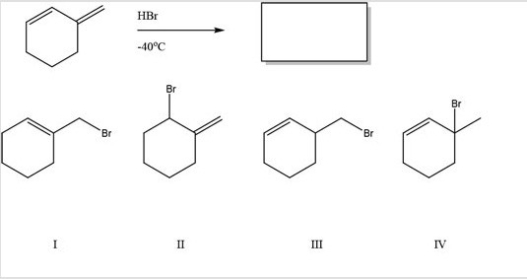
A) I
B) II
C) III
D) IV
Correct Answer

verified
Correct Answer
verified
Multiple Choice
Which of the following is the appropriate term for the mechanism of the addition of HBr to 1,3-dienes?
A) Nucleophilic addition
B) Electrophilic addition
C) Free radical addition
D) Conjugate addition
Correct Answer

verified
Correct Answer
verified
Multiple Choice
What is the major organic product of the following reaction? 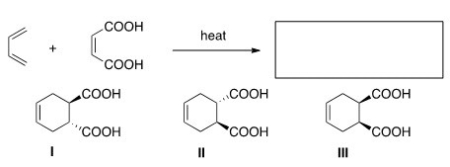
A) Only I
B) Only II
C) Only III
D) Only I and II
Correct Answer

verified
Correct Answer
verified
Multiple Choice
Which of the following statements about the mechanism of the Diels-Alder reaction is true?
A) Three π bonds break; two σ bonds and one π bond form.
B) Three π bonds break; one σ bond and two π bonds form.
C) Two π bonds break; one σ bond and one π bond form.
D) Two π bonds break; two σ bonds and one π bond form.
Correct Answer

verified
Correct Answer
verified
Multiple Choice
Which triene has the largest heat of hydrogenation? 
A) I
B) II
C) III
D) IV
Correct Answer

verified
Correct Answer
verified
Multiple Choice
What is (are) the major product(s) of the following reaction? 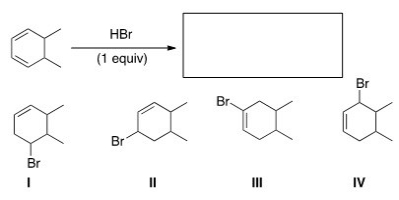
A) Only I
B) Only II and IV
C) Only I and III
D) Only I,II,and III
Correct Answer

verified
Correct Answer
verified
Multiple Choice
Why would the compound below not react with a dienophile in a Diels-Alder reaction? 
A) The compound is not a conjugated diene.
B) There are no electron withdrawing groups on the compound.
C) There are no electron donating groups on the compound.
D) The compound cannot adopt the s-cis conformation.
Correct Answer

verified
Correct Answer
verified
Multiple Choice
Which triene has the smallest heat of hydrogenation? 
A) I
B) II
C) III
D) IV
Correct Answer

verified
Correct Answer
verified
Multiple Choice
Rank the following anions from most to least stable,listing the most stable first. 
A) I> II > III
B) III > II > I
C) I > III > II
D) III > I > II
Correct Answer

verified
Correct Answer
verified
Multiple Choice
Which of the following statements about the Diels-Alder reaction is true?
A) The diene can react only when it adopts the s-trans conformation.
B) Electron-withdrawing substituents in the diene increase reaction rate.
C) Electron-donating substituents in the dienophile increase the reaction rate.
D) The stereochemistry of the dienophile is retained in the product.
Correct Answer

verified
Correct Answer
verified
Multiple Choice
What is the major product of the following reaction? 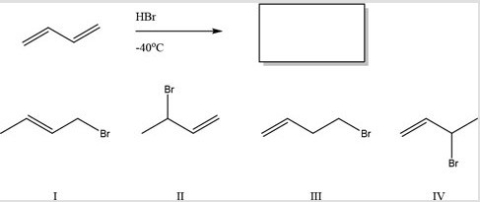
A) I
B) II
C) III
D) IV
Correct Answer

verified
Correct Answer
verified
Multiple Choice
What is the major organic product of the following reaction? 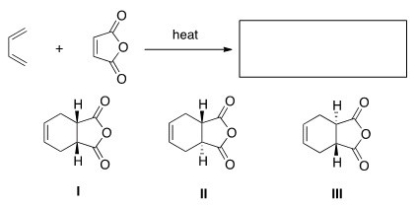
A) Only I
B) Only I and II
C) Only II and III
D) I,II,and III
Correct Answer

verified
Correct Answer
verified
Multiple Choice
Which of the following compounds is conjugated? 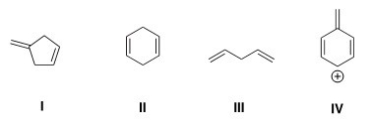
A) I
B) II
C) III
D) IV
Correct Answer

verified
Correct Answer
verified
Multiple Choice
What is (are) the major product(s) of the following reaction? 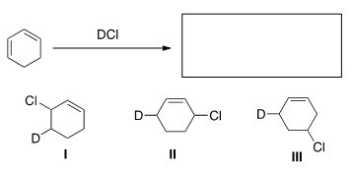
A) Only I
B) Only II
C) Only I and II
D) I,II,and III
Correct Answer

verified
Correct Answer
verified
Multiple Choice
What is the major organic product of the following reaction? 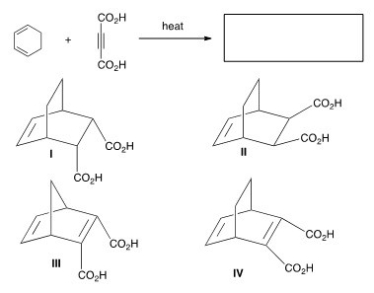
A) I
B) II
C) III
D) IV
Correct Answer

verified
Correct Answer
verified
Multiple Choice
What is the major product of the following reaction? 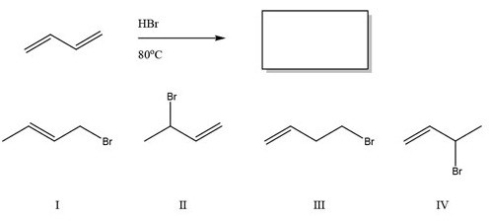
A) I
B) II
C) III
D) IV
Correct Answer

verified
Correct Answer
verified
Multiple Choice
Which of the following is the least reactive diene in a Diels-Alder reaction? 
A) I
B) II
C) III
D) IV
Correct Answer

verified
Correct Answer
verified
Multiple Choice
Which of the following compounds is the least reactive dienophile in a Diels-Alder reaction? 
A) I
B) II
C) III
D) IV
Correct Answer

verified
Correct Answer
verified
Showing 21 - 40 of 53
Related Exams